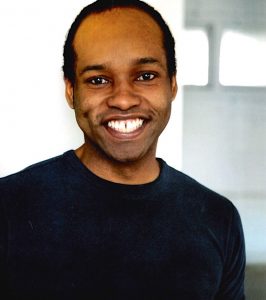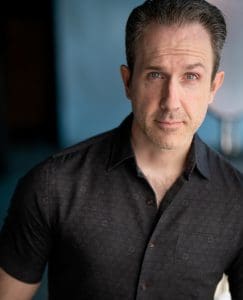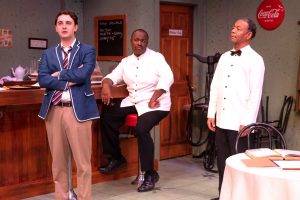The more you examine the work of South African playwright Athol Fugard, the more you realize that the racial dynamics in his dramas reveal as much about our own social ills as they do about the specific culture in which he was raised. Though it’s true that many of the 87-year-old author’s 40 or so plays were written in the context of Apartheid and its aftermath, they contain strong messages for any society that has tried to subjugate vast populations on the basis of race, religion, or sexual orientation. Like it or not, that includes us.

Damron Russel Armstrong
Athol’s works have exerted a substantial impact on theater for more than a half century, yet only recently have they made notable inroads in Kansas City. From November 15th through the 23rd the Black Repertory Theatre of Kansas City presents a “book in hand” reading of Blood Knot, a two-man drama widely recognized as one of the playwright’s early masterpieces. (It was first produced in Johannesburg in 1961 as The Blood Knot and revised in 1987.)
This follows on the heels of the Kansas City Actors Theatre’s eloquent production this September of the 1982 “Master Harold” … and the Boys. Yet beyond this and a few other sporadic presentations (Actors Theatre produced The Island in 2016, and the Coterie Theatre staged My Children! My Africa! in 1993), Athol has been a virtual stranger to the Kansas City stage.
“I’ve been drawn to him because of the unapologetic nature of his storytelling,” said Damron Russel Armstrong, president and founding director of the Black Repertory Theatre. To be sure, Athol himself is a member of South Africa’s white minority, but he has addressed his nation’s problems as a sharp-eyed observer. “He talks about Apartheid from his first-hand perspective of living it,” Damron said, “but from a second-hand experience of not being black: observing, and documenting, what Apartheid did to black people.”

Brian Paulette
Athol’s works deal with the humanity in universal terms, and thus Blood Knot can easily be seen to address the chaos of our own racial conversation. Its characters are recently reunited brothers, one darker-skinned and the other light-skinned enough that he has been able “pass” as white for much of his life. (Damron will be reading the part of Zachariah, Brian Paulette that of Morris.) When they are thrown together again in a one-room shack, fraternal love and a lifetime of resentment both bubble to the surface.
But the play employs this love-hate relationship to reflect on larger themes. “Athol Fugard uses deceptively simple language and stories to explore vividly specific individuals,” wrote a critic in Time at the time of the 1984 Yale Repertory Theatre revival, “Yet he makes every wrong step between them seem a natural metaphor for some larger collision of mankind. He knows that the domestic quarrel is the central tragedy of any age.”
For Damron, the brothers’ relationship underscores our own dysfunctional racial conversation in America. “We basically live in a post-traumatic, slave-disordered society,” he said. “It affects all of us. … But until we actually have a chance to sit and talk about it, can we ever make any progress toward ending it, toward extracting it from our society?”

Actors Theatre recently staged Athol’s ‘Master Harold’ / Photo by Brian Paulette
Blood Knot is about two men stuck in an endless cycle of non-productive dialogue, and in that sense it reminds us of our own quandary, which Damron likens to the film Groundhog Day.
“It speaks to this sort of purgatory that we all live in, where you keep trying to make a different ending to the story. … Slavery still affects everybody’s life. And yet the fact that we can’t sit down and have a conversation about it and acknowledge it, in order to move to a different narrative, always puts us into this sort of Groundhog Day cycle.”
Blood Knot will be presented at Plexpod Westport Commons. For tickets call 816-663-9966 or go to brtkc.org. To reach Paul Horsley, performing arts editor; send an email to paul@kcindependent.com or find him on Facebook (paul.horsley.501) or Twitter (@phorsleycritic).